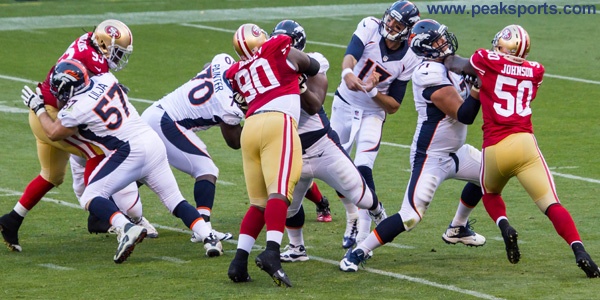
The Most Overlooked Aspect of being an Athlete
You can probably come up with a list of possibilities:
- Time Management
- Nutrition
- Speed and Agility
- Weight Training
- Flexibility
- Quick Decision Making
No doubt that many of these aspects can improve athletic performance.
However, athletes most often neglect themselves or their mental well-being. In recent years, the news has brought to the forefront many athletes who have come forth to talk about mental well-being, such as Lane Johnson (football), Michael Phelps (swimming), Simone Biles (gymnastics), Naomi Osaka (tennis), etc.
These high-profile athletes have highlighted how competitive pressure and life stressors have significantly impacted their lives and mental well-being.
3 Misconceptions about the Mental Health of Athletes
MISCONCEPTION #1: “Focusing on mental health is a sign of mental weakness.”
Mental health is stigmatized, especially in the world of sport. Recognizing the importance of mental well-being or the need for tending to mental health is a sign of strength.
The term “mental toughness” is often thrown around in the sporting world. However, mental toughness is not putting your head down and blasting through adversity. Mental toughness is recognizing the existence of adverse times, determining the cause and scope of the issues, and finding solutions or assistance to face our hardships.
MISCONCEPTION #2: “Elite athletes do not have mental health issues.”
When you think of a word to describe elite, Olympic, and professional athletes, you probably think of “warrior.” However, watching athletes compete, you only see a tiny portion of who they are. Just because an athlete has not publicly admitted to experiencing mental health issues doesn’t mean problems are nonexistent.
Athletes are more than physical beings. Prioritizing mental health helps you deal with the pressure of competition and life stressors.
MISCONCEPTION #3: “Mental health does not affect athletic performance.”
Some athletes can compete at a high level while experiencing emotional turmoil. However, athletes are not two separate people. It is ludicrous to think you can take the athlete out of the person or the person out of the athlete.
While we can learn to minimize mental health effects with outside help, putting a lid on our problems can have devastating impacts on who we are as athletes and humans in a stress-filled world.
NBA basketball player Kevin Love summed up mental health in the following statement.
LOVE: “Everyone is going through something that we can’t see. The thing is because we can’t see it, we don’t know who is going through what and we don’t know when and we don’t always know why. Mental health is an invisible thing, but it touches all of us at some point or another. It is part of life.”
It all boils down to one guiding principle. Athletes are people. People are emotional beings. Emotional beings will experience problems in many areas of life. You can become the best versions of yourself when you reach out for support.
Your mental well-being affects every aspect of your life. If you want to become successful in athletics, education, business, relationships, and life in general, you cannot afford to neglect your mental well-being.
Tip for Athletes Tending to their Mental Well-Being:
This tip is essential. Mental well-being is crucial for our overall health. It is vital to overcome the stigma of mental well-being and the belief that personal issues are a sign of weakness.
Not only is it okay to ask for support, but support is also necessary to become the best athlete and person we can become.
Related Sports Psychology Articles
- How to Succeed Against the Odds in Sports
- Creating a Healthy Experience for Young Athletes
- Achieve Proactive Confidence for a Healthy Life Balance
*Subscribe to The Sports Psychology Podcast on iTunes
*Subscribe to The Sports Psychology Podcast on Spotify
Download a free sports psychology report to improve your mental game!
Learn more about our one-on-one mental game coaching.
The Confident Athlete

“The Confident Athlete” consists of 2 audio programs that include 14 days of confidence fueling exercises and a simple to follow workbook that guides you through the 14 days, helps you apply the strategies, and customizes the exercises to your personal needs.
Let me help you put a stop to the confidence leak. You can learn to have greater levels of confidence in competition than you do in practice by identifying the specific ways you undermine your own confidence and how to convert your practice confidence into COMPETITIVE CONFIDENCE.
“The Confident Athlete” is a ground-breaking system to teach you how to think like a champion and have ultimate self-confidence every time you step on the playing field, court, track, or course. The confident athletes was developed for any athlete – junior to professional –that wants to gain confidence. However, coaches and sports parents can learn how to teach others to perform with ultimate confidence. Use my program if you want to bust a slump or just wanting higher or more consistent levels of self-confidence.
